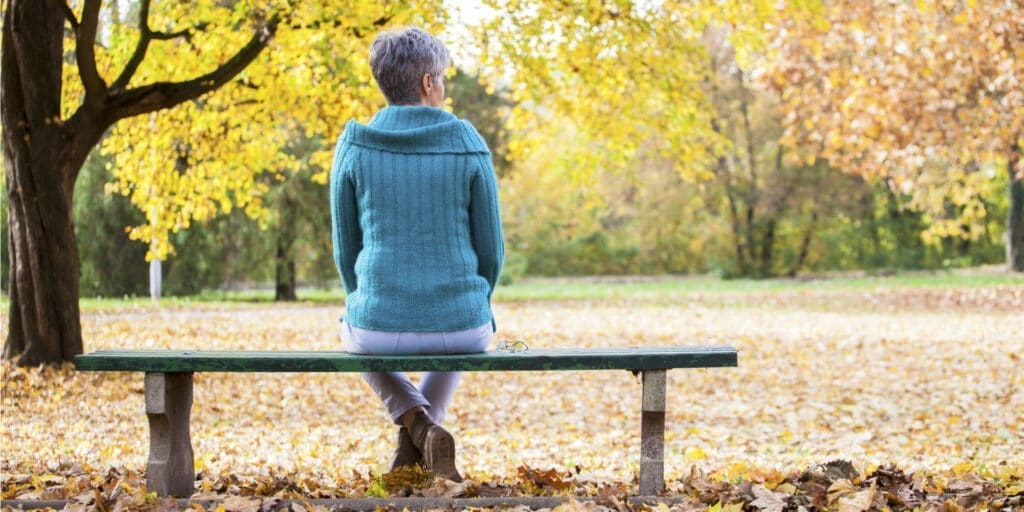Depending on where you live, winter is probably in full swing. Temperatures across the country continue to fall, the sun is setting before dinner time, and we’re all spending more indoors. For many, the changing of seasons is a time to commemorate the holidays, mark the end of another year, or make the yearly migration to warmer weather. However, for some, seasonal changes can bring feelings of sadness or hopelessness. This is known as seasonal depression, and for millions of Americans, it can ruin the most wonderful time of the year. Today, we’ll go over how to cope with seasonal depression and how it differs from other types of depression.
What Is Seasonal Depression?
 Seasonal affective disorder (SAD), also known as seasonal depression, is a type of depression that is related to changes in seasons. For most people with seasonal depression, symptoms start in the fall and will last until the warmer days of spring. Typically, the symptoms of seasonal depression are at their worst in the winter months. Less often, seasonal depression can crop up during the summer months, although this is quite rare.
Seasonal affective disorder (SAD), also known as seasonal depression, is a type of depression that is related to changes in seasons. For most people with seasonal depression, symptoms start in the fall and will last until the warmer days of spring. Typically, the symptoms of seasonal depression are at their worst in the winter months. Less often, seasonal depression can crop up during the summer months, although this is quite rare.
It’s estimated that nearly five percent of adults in the United States suffer from some form of seasonal affective disorder. Symptoms of seasonal depression will last, on average, for about 40% of the year, with some cases lasting for well over half of the year. Seasonal depression also appears to be more common in women than men, although scientists are unsure why this may be.
Seasonal depression has been linked to a biochemical imbalance in the brain prompted by shorter daylight hours and less sunlight in winter. As seasons change, people experience a shift in their internal biological clock, or circadian rhythm, that can cause them to be out of step with their daily schedule. Seasonal depression is more common in people living far from the equator, where there are fewer daylight hours in the winter.
What Causes Seasonal Depression?
The specific causes of seasonal depression are unknown. However, scientists believe that a few factors may play a role in its development. Some of the leading theories behind the causes of seasonal depression include:
- Biological Clock: One of the leading theories behind the causes of seasonal depression is your biological clock. During the winter months, when seasonal depression is most common, the reduced levels of sunlight cause the onset of SAD symptoms. This decrease in sunlight is thought to disrupt your body’s internal clock and lead to feelings of depression.
- Serotonin Levels: A drop in serotonin (a brain chemical responsible for mood) is thought to play a role in seasonal depression. Reduced sunlight can cause a reduction in serotonin, which may trigger depression.
- Melatonin Levels: Changes in seasons can interfere with the body’s melatonin production, which plays a role in your sleep patterns and mood. When this happens, depressive symptoms may follow.
Signs of Seasonal Depression
In most cases of seasonal depression, symptoms appear during late fall or early winter and will subside with the coming of spring. Symptoms of seasonal depression may start as mild, often referred to as the “winter blues,” and can become more severe as the season progresses.
Common signs of seasonal depression include:
- Feeling listless, sad, or down most of the day, almost every day
- Having low energy or feeling sluggish
- Losing interest in activities you used to enjoy
- Changes in appetite such as experiencing carbohydrate cravings, overeating, or weight gain
- Sleeping too much
- Difficulty concentrating
- Feeling hopeless, worthless, or guilty
- Thoughts of suicide
It’s important to remember that the signs and symptoms of seasonal depression will often mirror those of other depressive disorders such as major depressive disorder. However, unlike these other conditions, symptoms of seasonal depression will come and go with the changing of seasons.
How to Cope With Seasonal Depression
 There are many ways to cope with seasonal depression, but the first thing you can do to help cope with seasonal depression is talk with your doctor. While the symptoms of seasonal depression come and go, it’s still a form of depression and needs to be diagnosed by a professional. If you have seasonal depression, seeing a professional can help you find ways to manage your symptoms and put you on the right path towards a healthy, happy lifestyle.
There are many ways to cope with seasonal depression, but the first thing you can do to help cope with seasonal depression is talk with your doctor. While the symptoms of seasonal depression come and go, it’s still a form of depression and needs to be diagnosed by a professional. If you have seasonal depression, seeing a professional can help you find ways to manage your symptoms and put you on the right path towards a healthy, happy lifestyle.
While there is no way to prevent seasonal depression, there are several ways you can effectively cope with your symptoms. Aside from talking with your doctor, there are some effective ways you can cope with seasonal depression symptoms at home.
Seek Out Sunlight Exposure
One of the most common theories why people suffer from seasonal depression is lack of exposure to natural light. So, it’s no surprise that getting more sunlight can be a great way to cope with seasonal depression. Whether this comes from simply getting outside and going for a walk or a form of therapy known as “phototherapy,” getting more sunlight is crucial for combatting seasonal depression.
Numerous studies have shown that phototherapy can help treat seasonal depression. What’s even more beneficial is that you don’t necessarily need to see a doctor or therapist for this type of treatment. There are many different lightboxes available for purchase that are dedicated to helping you cope with seasonal depression.
However, to be truly effective, you should make sure that the lightbox generates at least 10,000 lux (100 times stronger than a standard lightbulb) and that it has white or blue (not yellow) light. If light therapy isn’t for you, you can always try to get as much natural sunlight as possible. Try going for a walk, waking up earlier in the morning, or simply sitting by the window.
Manage Your Diet, and Watch the Carbs
Research has shown that individuals with seasonal depression tend to eat more carbohydrate-rich foods. They also have a tendency to overeat during these periods of “seasonal lows,” so it’s essential that they look after their diets in order to feel more energized.
During the winter months, we get less sunlight, and as a result, our bodies produce less vitamin D. Vitamin D is sometimes called the “sunshine vitamin” because it’s produced in your skin in response to sunlight. While your body naturally produces vitamin D in response to sunlight, you can supplement this with your diet.
Research has shown that vitamin D might play an important role in regulating mood and warding off depression. In one study, researchers found that people with seasonal depression who received vitamin D supplements saw a significant improvement in their symptoms when compared to those who had not.
The bottom line? If you’re struggling with seasonal depression, try substituting those carbs for some fruit, or simply try adding some vitamin D supplements to your daily routine.
Stay Active
As always, maintaining an active lifestyle can help stave off a number of health conditions, including seasonal depression. Since many of the hallmarks of seasonal depression include symptoms like fatigue, lethargy, and reclusiveness, making an effort to stay physically active can offer a boost of energy and improve mood.
Outdoor activities such as hiking, running, or biking are all great ways to cope with seasonal depression, as they also expose you to natural light. However, if braving the cold winter temperatures isn’t for you, try using a treadmill, stationary bike, or elliptical machine set close to a window at home or at the gym.
Lastly, don’t be so quick to brush off those yearly feelings as just another case of the winter blues. If you suspect that you may be struggling with seasonal depression, don’t go at it alone. There are a number of steps you can take to help improve your mood and help you better cope with your symptoms.
What Helps Your Seasonal Depression?
Tell us how you fight off the winter blues in the comments below!
What topics related to mental health should we cover next?
Email us your ideas at info@painresource.com
Are you a member of our online community?

